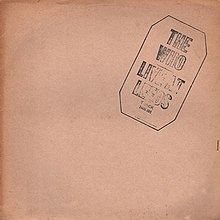Live At Leeds
| Live at Leeds | ||||
|---|---|---|---|---|
 |
||||
| Live album by The Who | ||||
| Released | 16 May 1970 | |||
| Recorded | 14 February 1970 University Refectory University of Leeds Leeds, West Riding of Yorkshire |
|||
| Genre | Hard rock | |||
| Length | 37:42 | |||
| Label | Decca, MCA | |||
| Producer | Jon Astley, Kit Lambert, The Who | |||
| The Who chronology | ||||
|
||||
| Singles from Live at Leeds | ||||
|
||||
| Professional ratings | |
|---|---|
| Review scores | |
| Source | Rating |
| AllMusic | |
| Robert Christgau | B |
| Entertainment Weekly | A+ |
| Mojo | |
| MusicHound | 4/5 |
| Q | |
| The Rolling Stone Album Guide | |
| Uncut | |
Live at Leeds is the first live album by the English rock band The Who. It was the only live album that was released while the group were still actively recording and performing with their best known line-up of Roger Daltrey, Pete Townshend, John Entwistle and Keith Moon. Initially released in the United States on 16 May 1970, by Decca and MCA and the United Kingdom on 23 May 1970, by Track and Polydor, the album has been reissued on several occasions and in several different formats. Since its initial reception, Live at Leeds has been cited by several music critics as the best live rock recording of all time.
By the end of the 1960s, particularly after releasing Tommy in May 1969, The Who had become cited by many as one of the best live rock acts in the world. According to biographer Chris Charlesworth, "a sixth sense seemed to take over", leading them to "a kind of rock nirvana that most bands can only dream about". The band were rehearsing and touring regularly, and Townshend had settled on using the Gibson SG as his main touring instrument, that allowed him to play faster than other guitars. He began using Hiwatt amplifiers that allowed him to get a variety of tones simply by adjusting the guitar's volume level.
Realising that their live show stood in equal importance to the rock-opera format of Tommy, the group returned to England at the end of 1969 with a desire to release a live album from concerts recorded earlier in the US. However, Townshend balked at the prospect of listening to all the accumulated recordings to decide which would make the best album, and, according to Charlesworth, instructed sound engineer Bob Pridden to burn the tapes. Townshend later confirmed the tapes were indeed burnt in his back garden.
Two shows were consequently scheduled, one at the University of Leeds and the other in Hull, for the express purpose of recording and releasing a live album. The Leeds concert was booked and arranged by Simon Brogan, who later became an assistant manager on tour with Jethro Tull. The shows were performed on 14 February 1970 at Leeds and on 15 February 1970 at Hull, but technical problems with the recordings from the Hull gig — the bass guitar had not been recorded on some of the songs — made it all the more necessary for the show from the 14th to be released as the album.
...
Wikipedia
